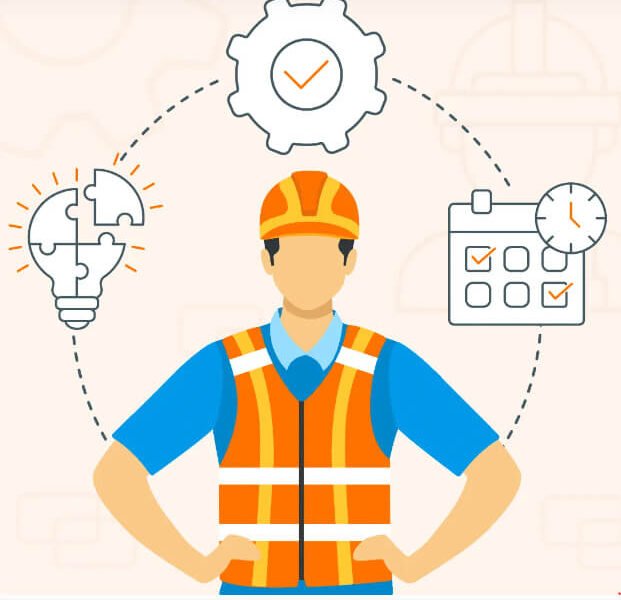In the dynamic world of construction, there is one thing most inherent to success—risk. Outcomes can be anything from safety hazards to budget overruns; this is a very long list. Construction consultants perform the very important function of mitigating these risks to ensure timely, cost-effective, and high-quality completion of projects. This blog delves into why construction consultants are key to risk management, with a focus on how they secure your investments concerning construction projects.
1. Be Aware of the Risks Involved in a Construction Project
Construction projects are saturated with a lot of, somewhat risky, areas that could turn south with the faintest mistake in management. In most cases, these risks would be financial, operational, legal, environmental, and safety risks.
Financial Risks: These include risks of costing overruns, budget mismanagement, and unexpected expenses that could stretch the financial resources of the project. Common financial risks are estimates of project costs that are underestimated and hence result in a cost overrun.
Operational Risks: Delays in project timelines, inadequate resource management, and poor coordination among stakeholders are examples of such operational risks that may hit the smooth execution of the project.
Legal Risks: Risks include regulations related to non-compliance, contract disputes, and other legal issues. Legal risks cause project delays, impose penalties, and may lead to litigation.
Environmental Risks : Construction projects will have to comply with environmental regulations and safeguard nature from their activities. Otherwise, they will attract fines and the project will as well be stopped.
Risk to Safety: Construction sites are innately hazardous; these involve such areas as accidents, injuries, up to and sometimes entailing death. Such risks at times will lead to delays in the completion of the project, higher insurance premiums, and a client getting a poor reputation.
2. The Role of Construction Consultants in Identifying and Assessing Risk
Risk identification and assessment are the initial steps in risk management. Due to experience, professional knowledge, and skill, the construction consultants are able to identify the potential risks that are most likely to affect the project in a systematic way.
Risk Identification: Risk identification involves detailed assessment by consultants of project scope, site conditions, and requirements from all stakeholders. Such consultants consider factors such as project complexity, location, and the regulatory environment.
After identification, the consultants further analyze how likely the risks are to occur and, if so, what their impact will be on the project. It also means that consultants prioritize the identification by ranking it in terms of severity and develop a risk register, which gives the risks involved, the impact, and mitigation.
Construction consultants will be in a position to take a more comprehensive view of risks by utilizing various tools and methodologies for risk assessment, which include SWOT analysis, risk matrices, and expert judgment. The astuteness in predicting possible anticipated challenges by construction consultants enables the project teams to take appropriate measures to sort out problems, which in real terms may escalate.
3. Risk Management Plan Development
It would have a risk management plan, well structured, to govern the management of risks throughout the project life cycle. Construction consultants will be important in the making of this risk management plan, making sure that the plan complies with the project’s goals as well as local stakeholders’ expectations.
Risk Mitigation Strategies: The proposed risk mitigation strategies would be prepared by consultants based on identified risks. Here are a few examples: contingency plan, how resources are to be allocated, safety, etc. For instance, in mitigating financial risks, consultants could recommend setting aside a contingency budget.
Risk Monitoring: The risk management plan allows for the continuous monitoring of risks throughout the project works. Consultants set up performance indicators and reporting mechanisms through which the level of risk is tracked for timely interventions if need be.
Communication Plan: Proper communication is a very effective tool in risk management. The consultants ensure transparency by making all relevant parties aware of possible risks, ways of mitigigating them, the roles they have to play in the process of risk management, and hence promoting collaboration between the teams involved in the project.
4. Implementing Risk Control Measures
Once the risk management plan is set up, the next step is to implement risk control measures; in this instance, construction consultants fit well in this phase, ensuring a project team is following the plan and adhering to protocols set up accordingly.
Safety Management: Regarding safety, safety is a big concern for construction, and it is provided by consultants. The safety measures, guidelines, and rules are put forth, giving workers training, and there are a lot of routine safety audits.
Quality Control: Quality control measures are taken by the consultants to eliminate defects and reduce extra work. Here, they set standard quality, conduct inspection, and take care of materials and workmanship to meet the required specifications.
Management of Contracts: It is managed in such a way that legal risks are also properly managed. Therefore, contracts are reviewed by consultants to ensure that relevant laws and policies are adhered to for the interest protection of a client. Proper contractual relationship management is also ensured with subcontractors and suppliers to mitigate disputes.
5. Risks Monitoring and Reviewing at the Project Lifecycle
Since risk management is a process, its monitoring and reviewing should be continuous. This is also championed by construction consultants in the execution phase by ensuring that all risks are appropriately managed through all phases of the project.
Progress Tracking: The consultants will measure the advancement of the project against the risk management plan made. They track key indicators in the areas including schedule adherence, budget compliance, and safety performance to spot potential risks pretty early.
Renewal of Risk Assessment: Whenever projects are ongoing, other risks have possibilities of appearing and the existing ones of developing. Through periodic risk assessment, the consultants aim at keeping the risk management schedule updated and relevant. They would update the risk register and consider suitable mitigation strategies.
Reporting and Documentation: Proper and regular reporting is, of course, necessary to inform the stakeholders of the level of the risks being faced and the activities undertaken to manage them. Very detailed and comprehensive reports are developed by consultants, which document all the things done in risk management. Such a report shows where success was realized and also offers possibilities for improvement.
6. The Significance of Risk Management in Protecting Your Investment
Effective risk management is at the core of safeguarding one’s investment in construction projects. Construction consultants certainty of making sure that all the risks for a project have been duly identified, assessed, and managed right from the outset of the project. This goes a long way in reducing the chances of expensive delays, cost overruns, and litigations.
Cost efficiency: Consultants help in avoiding those costly issues that would only prove shaky, flawed, or unsound to projects. By risk prevention and early detection and mitigation, they ensure that projects operate within the set costs and add value to the proposed investment.
Timely project completion: Effective management of risks will decrease the chances for delays, and the project will be completed in the right and set time. A lot of money can be lost due to huge delays in construction.
Compliance and Reputation: The project is managed by consultants to comply with all relevant regulations and standards; hence, they ultimately protect the reputation of the client. This also protects the client himself from the legal penalties given for breaking these laws. Further, if a project complies with the safety and environmental standards, communities have supported the project and will enhance the client’s industrial position.
Conclusion
The importance of risk management is in safeguarding your investment in the complex, high-stake world of construction. Construction consultancies bring invaluable expertise to identify, assess, and manage risks throughout the project life cycle. Partner with experienced consultants in construction to be assured that your project is delivered within time, appropriate to budget, and within quality standards. Investing in professional construction consulting services isn’t all about risks; it’s a sure guarantee of the success of your project and the protection of returns on investment made. Whether you intend to embark on a small renovation or a grand-scale development, construction consultants are really your key allies in the challenges and complexities of getting the project done. For more blog info visit here.






